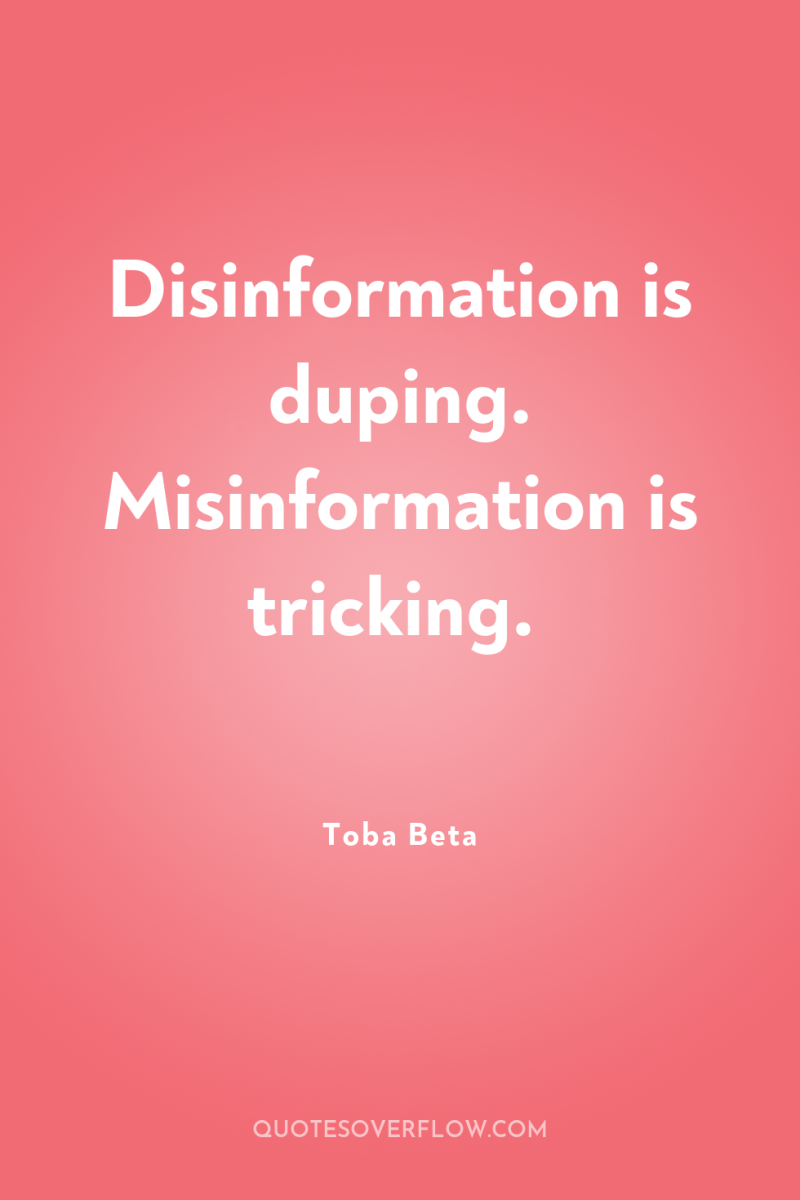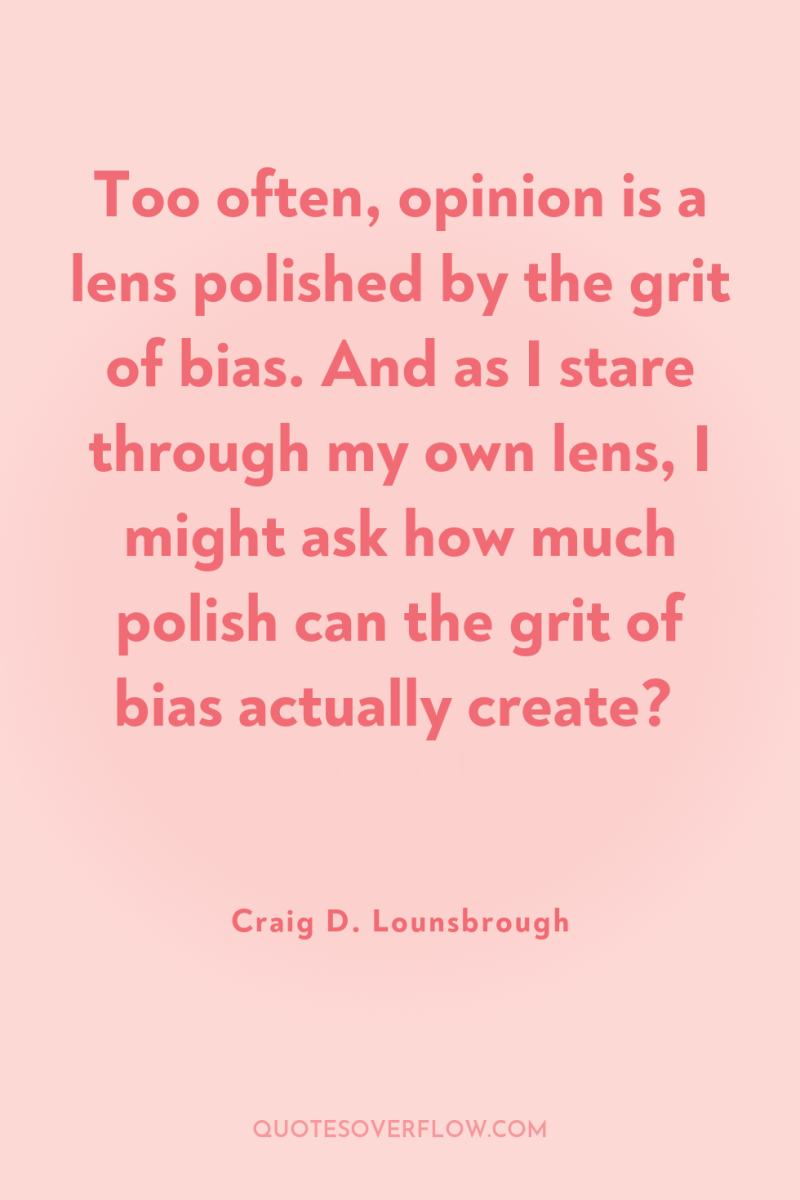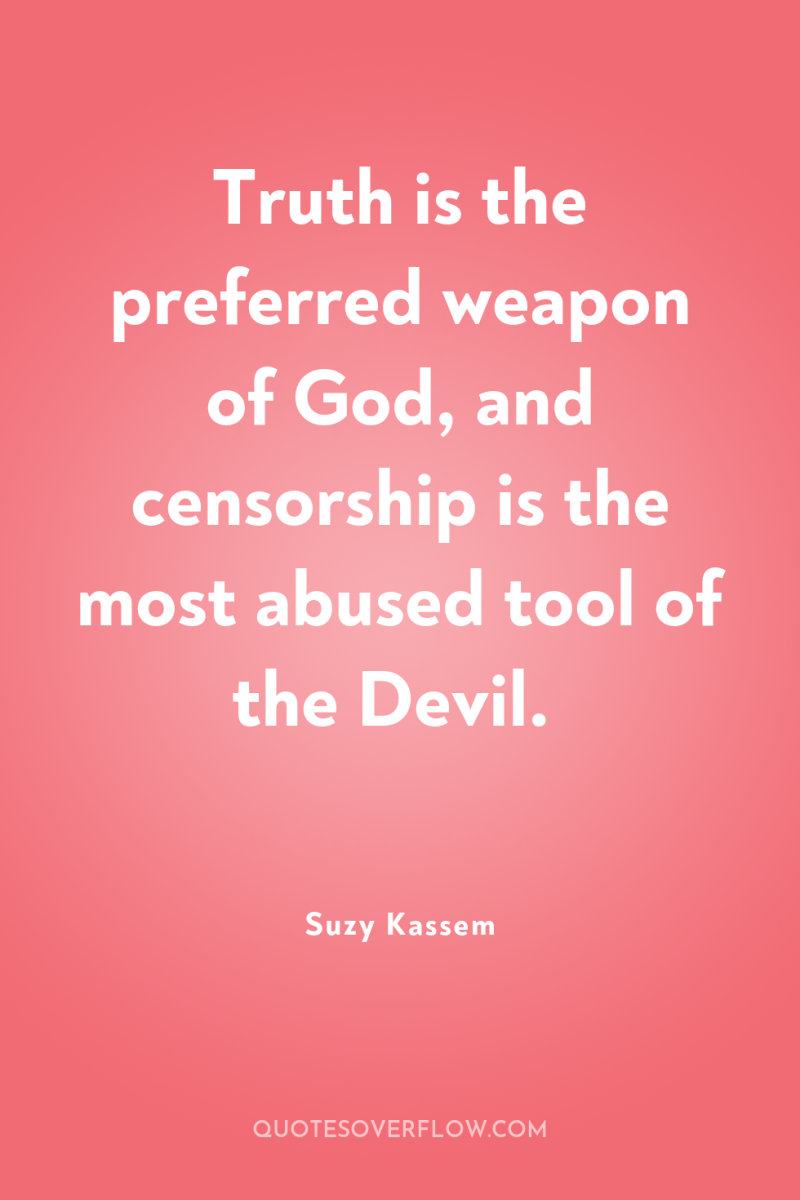1
The time will come when diligent research over long periods will bring to light things which now lie hidden. A single lifetime, even though entirely devoted to the sky, would not be enough for the investigation of so vast a subject.. And so this knowledge will be unfolded only through long successive ages. There will come a time when our descendants will be amazed that we did not know things that are so plain to them.. Many discoveries are reserved for ages still to come, when memory of us will have been effaced.Seneca

2
Disinformation is duping. Misinformation is tricking.Toba Beta

3
Too often, opinion is a lens polished by the grit of bias. And as I stare through my own lens, I might ask how much polish can the grit of bias actually create?Craig D. Lounsbrough

4
Truth is the preferred weapon of God, and censorship is the most abused tool of the Devil.Suzy Kassem
5
The internet is a blessing and curse, because it's a gateway to an endless plethora of information. However it's flooded with pseudoscience, fringe science, false information, contrived statements, pure lies, & utter misrepresentations of facts. It's essentially a situation were you're mining for genuine gold in a cave of fools gold, & while genuine gold exists, it's overwhelmed & obscured so often by imitation.Trevor Driggers

6
The less he understands something, the more firmly he believes in it.Wilhelm Reich

7
How easy it is for so many of us today to be undoubtedly full of information yet fully deprived of accurate information.Criss Jami
8
Darwin theorized that mankind (both male and female) evolved alongside each other over millions of years, both reproducing after their own kind before the ability to physically have sex evolved. They did this through “asexuality” (“without sexual desire or activity or lacking any apparent sex or sex organs”). Each of them split in half: “Asexual organisms reproduce by fission (splitting in half).Ray Comfort
9
People who have practiced occult religions for many years are being told that they don't know the first thing about their own religion and its beliefs and practices - and that a bunch of zealots from another religion posing as 'experts' (in a religion they despise/ fear/ oppose and who peddle slander and misinformation about occult religions), are more credible than they are. Non Seqitur. This does not follow.Christina Engela
10
Much like humans, opinions come in all shapes and forms, but in the end, they are just what they are; and may yet still be categorized in nature. The first you might say is the Indoctrinal, which is, of course, dictated by community and necessity, by the human need for acceptance; secondly, there is the Personal, and this is often dictated by individuality, by the yearning to seem interesting and intelligent, or free, or special; and lastly comes the Emotional. This is most commonly dictated by circumstance and bitterness and excitement. However, rarely do we find the case in which any of these are dictated by reason in the pure state: it is by this we see that at the core of a number of false opinions lies not always misinformation but quite often some issue of the human self. .Criss Jami
11
During the flames of controversy, opinions, mass disputes, conflict, and world news, sometimes the most precious, refreshing, peaceful words to hear amidst all the chaos are simply and humbly 'I don't know.Criss Jami
12
Journalists are never hungry. They swallow everything.Ljupka Cvetanova
13
Besides stage magic props and settings, ritually abusing groups use technology, such as that described by Katz and Fotheringham. Military/political groups have the most sophisticated technologies, and much training or programming is now done with virtual reality equipment. Movies and holograms are used to deceive a child into believing in things that are unreal. When a client says to you “I don't know if it's real; how can it be real?” remember that there are several options, not just two: (1) It happened just as s/he remembers; (2) it did not happen at all; (3) something happened, but due to technology and/or trickery it was not what s/he thinks it was; (4) the thought that the memory must be unreal is itself a program, as described in Chapter Twelve, “Maybe I made it up."p55.Alison Miller
14
Not only do skeptics such as Lanning choose to ignore eyewitness/victim accounts of ritual criminal activity, they apparently also choose to overlook the significant number of cases of ritual abuse in which perpetrators have confessed to their crimes. In the Bottoms et al. (1991; 1993) study of 2, 292 cases of ritual abuse, perpetrators in 30% of the child cases confessed to abusing one or more children, and perpetrators in 15% of adult cases confessed to perpetrating as well. In the case studied by Snow and Sorenson (1990), two adolescent perpetrators admitted to charges of abuse. Both of these sets of data require further analysis to determine which acts of ritual abuse were confessed to by what number of perpetrators. Corroboration and eyewitness accounts offered by children should also be given serious attention when therapists and investigators can demonstrate that no contamination of the children’s disclosures has taken place. In the case studied by Jonker and Jonker-Bakker (1991), children from different schools and different locales gave accounts of perpetrators, abuse locations, and abusive acts that were mutually corroborating. Accounts of tunnels under the McMartin preschool given by children claiming to have been ritually abused at the school were fully corroborated when the existence and location of the tunnels were documented by a professional team of archaeologists (Summit, 1994)."from Denying Ritual Abuse of ChildrenThe Journal of Psychohistory 22 (3) 1995 .Catherine Gould
15
It has become fashionable in the last several years for the media to minimize and even dissemble about the data which so strongly support the existence of ritual abuse. Amazingly, this has happened even in relation to ritual abuse cases in which criminal convictions have been obtained. Parenting magazine (Ruben, 1994), for example, asserted that “far more cases (of ritual abuse) end in acquittal” than in conviction. In fact, 58% of the ritual abuse cases in the Finkeihor (1988) study that went to trial resulted in convictions. In the Kelly (1992b) study, convictions were obtained in 80% of the ritual and sexual abuse cases combined; since there were no significant differences between the rates of criminal conviction in these two groups, we can surmise that convictions were obtained in approximately 80% of the ritual abuse cases Kelly studied. Finally, and most significant given the thousands of cases studied, convictions were obtained in 11% of all ritual child abuse cases studied by Bottoms et al. (1991; 1993)."from Denying Ritual Abuse of ChildrenThe Journal of Psychohistory 22 (3) 1995.Catherine Gould
16
The feminist movement as we have come to know it in recent decades is fundamentally a "con."..As it is considered treasonous to criticise a sister feminist, no standards of accuracy or honesty are ever enforced. Hyperbole and deceit thus become the formula for success, "peer review" playing no role in reining in misinformation. Any would-be feminist who raises scholarly objections to the rampant misinformation is branded an 'enemy of women' and is drummed out of the movement.Robert Sheaffer
17
Constantly exposing yourself to popular culture and the mass media will ultimately shape your reality tunnel in ways that are not necessarily conducive to achieving your Soul Purpose and Life Calling. Modern society has generally ‘lost the plot’. Slavishly following its false gods and idols makes no sense in a spiritually aware life.Anthon St. Maarten
18
In my client who had confessed her “alien abduction” experience, an alter had been instructed that if she began to remember the ritual abuse she was to remember the alien abduction, so that nobody would believe her account of the ritual abuse. This program did not work with us, but you can imagine the larger consequences of such a ruse.p55Alison Miller
19
In the specific case of the use of the term “false memory” to describe errors in details in laboratory tasks (e.g., in word-learning tasks), the media and public are set up all too easily to interpret such research as relevant to “false memories” of abuse because the term is used in the public domain to refer to contested memories of abuse. Because the term “false memory” is inextricably tied in the public to a social movement that questions the veracity of memories for childhood sexual abuse, the use of the term in scientific research that evaluates memory errors for details (not whole events) must be evaluated in this light." From: What's in a Name for Memory Errors? Implications and Ethical Issues Arising From the Use of the Term “False Memory” for Errors in Memory for Details, Journal: Ethics & Behavior 14(3) pages 201-233, 2004 .Jennifer J. Freyd
20
We propose that use of the term “false memory” to describe errors in memory for details directly contributes to removing the social context of abuse from research on memory for trauma. As the term “false memories” has increasingly been used to describe errors in details, the scientific weight of the term has increased. In turn, we see that the term “false memories” is treated as a construct supported by scientific fact, whereas other terms associated with questions about the veracity of abuse memories have been treated as suspect. For example, “recovered memories” often appears in quotations, whereas “false memories” does not (Campbell, 2003).The quotation marks suggest that one term is questioned, whereas the other is accepted as fact. Accepting “false memories” of abuse as fact reflects the subtle assimilation of the term into the cognitive literature, where the term is used increasingly to describe intrusions of semantically related words into lists of related words. The term, rooted in the controversy over the accuracy of abuse memories recalled during psychotherapy (Schacter, 1999), implies generalization of errors in details to memory for abuse–experienced largely by women and children (Campbell, 2003)."from: What's in a Name for Memory Errors? Implications and Ethical Issues Arising From the Use of the Term “False Memory” for Errors in Memory for Details, Journal: Ethics & Behavior .Jennifer J. Freyd
21
It's okay to be honest about not knowing rather than spreading falsehood. While it is often said that honesty is the best policy, silence is the second best policy.Criss Jami
22
The control of information makes history.DuzB August 2010
23
The point of modern propaganda isn't only to misinform or push an agenda. It is to exhaust your critical thinking, to annihilate truth.Garry Kasparov
24
When disinformation is running rampant, there are two ignorances that may emerge: the one is actually positive, a sort of pure and intentional emptying of the mind; but the other is of course negative and clogged and polluted.Criss Jami
25
A few years after I gave some lectures for the freshmen at Caltech (which were published as the Feynman Lectures on Physics), I received a long letter from a feminist group. I was accused of being anti-women because of two stories: the first was a discussion of the subtleties of velocity, and involved a woman driver being stopped by a cop. There's a discussion about how fast she was going, and I had her raise valid objections to the cop's definitions of velocity. The letter said I was making the women look stupid. The other story they objected to was told by the great astronomer Arthur Eddington, who had just figured out that the stars get their power from burning hydrogen in a nuclear reaction producing helium. He recounted how, on the night after his discovery, he was sitting on a bench with his girlfriend. She said, "Look how pretty the stars shine! " To which he replied, "Yes, and right now, I'm the only man in the world who knows how they shine." He was describing a kind of wonderful loneliness you have when you make a discovery. The letter claimed that I was saying a women is incapable of understanding nuclear reactions. I figured there was no point in trying to answer their accusations in detail, so I wrote a short letter back to them: "Don't bug me, Man! .Richard Feynman
26
Disinformation is distinguished from misinformation in that it is intentionally fraudulent.Ellen P. Lacter
27
Non-professionals can also misrepresent the personal characteristics, religious beliefs, and appearance, of these therapists, can name-call and otherwise mock them, and can attribute false agendas to them, such as assigning religious motives to secular therapists working with ritual abuse or mind control survivors. For example, there is little to prevent someone from claiming on his or her own website that a psychotherapist is a fundamentalist Christian zealot at war with Satan, when that therapist might be an atheist, Jew, Buddhist, etc., who places no stock in the existence of Satan. But such a claim, when spoken as if it is fact, accomplishes its intended purpose of maligning that therapist."- Common Forms of Misinformation and Tactics of Disinformation about Psychotherapy for Trauma Originating in Ritual Abuse and Mind Control (2012) .Ellen P. Lacter
28
Dr. Lois Jolyon West was cleared at Top Secret for his work on MKULTRA. West's numerous connections to the mind control network illustrate how the network is maintained, not through any central conspiracy, but by an interlocking network of academic relationships, grants, conferences, and military appointments. Some doctors in the network were not funded directly by the CIA or military, but their work was of direct relevance to mind control, non-lethal weapons development, creation of controlled dissociation and the building of Manchurian Candidates. .Colin A. Ross
29
Many professionals have to sign gagging clauses or face the sack if they speak out. The social worker and therapist was familiar with the scare that revelation brings to the survivor. […]We are in this story. It isn't ours, but we are in it nonetheless, not least because of the viscous campaign which has followed us over the last ten years. Any organisation with which we work may receive correspondence from the accused adults’ and ‘false memory’ movements. Some of these propagandists are confidentially dominating the professional and political arguments using new information technology to spread what we consider to be smears, innuendo and misinformation. P8(refers to authors Beatrix Campbell & Judith Jones — a journalist and a social worker/therapist).Beatrix Campbell
30
This monograph by Special Agent Ken Lanning (1992) is merely a guide for those who may investigate this phenomenon, as the title indicates, and not a study. The author is a well known skeptic regarding cult and ritual abuse allegations and has consulted on a number of cases but to our knowledge has not personally investigated the majority of these cases, some of which have produced convictions. p179[refers to Lanning, K. V. (1992)Investigator's guide to allegations of "ritual" child abuse. Quantico, VA: National Center for the Analysis of Violent Crime.] .Pamela Sue Perskin
31
Mis-information is rampant in this great age of mass-information. While we have more access to learning than ever before in the history of the world, we’re actually getting dumber it seems. The amount of (mis)information at everyone's fingertips has lured us into a false sense of knowing. Whether it be information about science, politics, or theology, our society is suffering from an inability to research, process, filter, and apply. At the same time we seem entirely oblivious to the zeitgeist (spirit of the age) that is nihilistic and libertine, making everything relative and subjective. And Satan himself rushes to blur our vision, stirring up the dust of confusion. The church must respond by teaching the critical faculties of logic and spiritual discernment, embedded in a cohesive framework of fides quaerens intellectum (faith seeking understanding). We must obtain a reasonable faith that is consistent with historic Christianity and relevant for our post-modern age. Otherwise, those rejecting the blatant errors of religious fundamentalism will be susceptible to every wind of false doctrine and repackaged heresy imaginable. They will leave the orthodox faith and accept something that vaguely resembles Christianity, but in reality is a vile concoction of demonic lies. .David D. Flowers
32
The above is stereotypical FMS rhetoric. It employs a formulaic medley of factual distortions, exaggerations, emotionally charged language and ideological codewords, pseudo-scientific assertions, indignant protestations of bigotry and persecution, mockering of religious belief, and the usual tiresome “witch hunt” metaphors to convince the reader that there can be no debating the merits of the case. No matter what the circumstances of the case, the syntax is always the same, and the plot line as predictable as a 1920's silent movie. Everyone accused of abuse is somehow the victim of overzealous religious fanatics, who make unwarranted, irrational, and self-serving charges, which are incredibly accepted uncritically by virtually all social service and criminal justice professionals assign to the case, who are responsible for "brainwashing" the alleged perpetrator or witnesses to the crime. This mysterious process of "mass hysteria" is then amplified in the media, which feeds back upon itself, which finally causes a total travesty of justice which the FMS people in the white hats are duty-bound to redress. By reading FMS literature one could easily draw the conclusion that the entire American justice system is no better than that of the rural south in the days of lynchings and the Ku Klux Klan. The Salem witch trials of the seventeenth century are always the touchstone for comparison. .Pamela Perskin Noblitt
33
The major goal of the Cold War mind control programs was to create dissociative symptoms and disorders, including full multiple personality disorder. The Manchurian Candidate is fact, not fiction, and was created by the CIA in the 1950’s under BLUEBIRD and ARTICHOKE mind control programs. Experiments with LSD, sensory deprivation, electro-convulsive treatment, brain electrode implants and hypnosis were designed to create amnesia, depersonalization, changes in identity and altered states of consciousness. (p. iii)“ Denial of the reality of multiple personality by these doctors [See page 114 for names] in the mind control network, who are also on the FMSF [False Memory Syndrome Foundation] Scientific and Professional Advisory Board, could be disinformation. The disinformation could be amplified by attacks on specialists in multiple personality as CIA conspiracy lunatics” (P.10)“If clinical multiple personality is buried and forgotten, then the Manchurian Candidate Programs will be safe from public scrutiny. (p.141).Colin A. Ross
34
The implication that the change in nomenclature from “Multiple Personality Disorder” to “Dissociative Identity Disorder” means the condition has been repudiated and “dropped” from the Diagnostic and Statistical Manual (DSM) of the American Psychiatric Association is false and misleading. Many if not most diagnostic entities have been renamed or have had their names modified as psychiatry changes in its conceptualizations and classifications of mental illnesses. When the DSM decided to go with “Dissociative Identity Disorder” it put “(formerly multiple personality disorder)” right after the new name to signify that it was the same condition. It’s right there on page 526 of DSM-IV-R. There have been four different names for this condition in the DSMs over the course of my career. I was part of the group that developed and wrote successive descriptions and diagnostic criteria for this condition for DSM-III-R, DSM—IV, and DSM-IV-TR.While some patients have been hurt by the impact of material that proves to be inaccurate, there is no evidence that scientifically demonstrates the prevalence of such events. Most material alleged to be false has been disputed by someone, but has not been proven false. Finally, however intriguing the idea of encouraging forgetting troubling material may seem, there is no evidence that it is either effective or safe as a general approach to treatment. There is considerable belief that when such material is put out of mind, it creates symptoms indirectly, from “behind the scenes.” Ironically, such efforts purport to cure some dissociative phenomena by encouraging others, such as Dissociative Amnesia.Richard P. Kluft
35
Deception and privileged secrets are common facets of politics.Wayne Gerard Trotman
36
It's like Sheriff Daniels sneezed, and they all caught the misinformation flu.Joe Schreiber
37
To your request of my opinion of the manner in which a newspaper should be conducted, so as to be most useful, I should answer, ‘by restraining it to true facts & sound principles only.’ Yet I fear such a paper would find few subscribers. It is a melancholy truth, that a suppression of the press could not more compleatly deprive the nation of its benefits, than is done by its abandoned prostitution to falsehood. Nothing can now be believed which is seen in a newspaper. Truth itself becomes suspicious by being put into that polluted vehicle. The real extent of this state of misinformation is known only to those who are in situations to confront facts within their knolege with the lies of the day. I really look with commiseration over the great body of my fellow citizens, who, reading newspapers, live & die in the belief, that they have known something of what has been passing in the world in their time; whereas the accounts they have read in newspapers are just as true a history of any other period of the world as of the present, except that the real names of the day are affixed to their fables. General facts may indeed be collected from them, such as that Europe is now at war, that Bonaparte has been a successful warrior, that he has subjected a great portion of Europe to his will, &c., &c.; but no details can be relied on. I will add, that the man who never looks into a newspaper is better informed than he who reads them; inasmuch as he who knows nothing is nearer to truth than he whose mind is filled with falsehoods & errors. He who reads nothing will still learn the great facts, and the details are all false.”– Letter to John Norvell, 14 June 1807[Works 10:417--18] .Thomas Jefferson
38
In her book claiming that allegations of ritualistic abuse are mostly confabulations, La Fontaine’s (1998) comparison of social workers to ‘nazis’ shows the depth of feeling evident amongst many sceptics. However, this raises an important question: Why did academics and journalists feel so strongly about allegations of ritualistic abuse, to the point of pervasively misrepresenting the available evidence and treating women disclosing ritualistic abuse, and those workers who support them, with barely concealed contempt? It is of course true that there are fringe practitioners in the field of organised abuse, just as there are fringe practitioners in many other health-related fields. However, the contrast between the measured tone of the majority of therapists and social workers writing on ritualistic abuse, and the over-blown sensationalism of their critics, could not be starker. Indeed, Scott (2001) notes with irony that the writings of those who claimed that ‘satanic ritual abuse’ is a ‘moral panic’ had many of the features of a moral panic: scapegoating therapists, social workers and sexual abuse victims whilst warning of an impending social catastrophe brought on by an epidemic of false allegations of sexual abuse. It is perhaps unsurprising that social movements for people accused of sexual abuse would engage in such hyperbole, but why did this rhetoric find so many champions in academia and the media? .Michael Salter
39
The witch-hunt narrative is now the conventional wisdom about these cases. That view is so widely endorsed and firmly entrenched that so widely endorsed and firmly entrenched that there would seem to be nothing left to say about these cases. But a close examination of the witch hunt canon leads to some unsettling questions: Why is there so little in the way of academic scholarship about these cases? Almost all of the major witch-hunt writings have been in magazines, often without any footnotes to verify or assess the claims made. Why hasn't anyone writing about these cases said anything about how difficult they are to research? There are so many roadblocks and limitations to researching these cases that it would seem incumbent on any serious writer to address the limitations of data sources. Many of these cases seem to have been researched in a manner of days or weeks. Nevertheless, the cases are described in a definitive way that belies their length and complexity, along with the inherent difficulty in researching original trial court documents. This book is based on the first systematic examination of court records in these cases. .Ross Cheit
40
Two half truths don't make one truth.Unknown
41
In a time when society is drowning in tsunamis of misinformation, it is possible to change the world for the better if we repeat the truth often and loud enough.Alberto Cairo